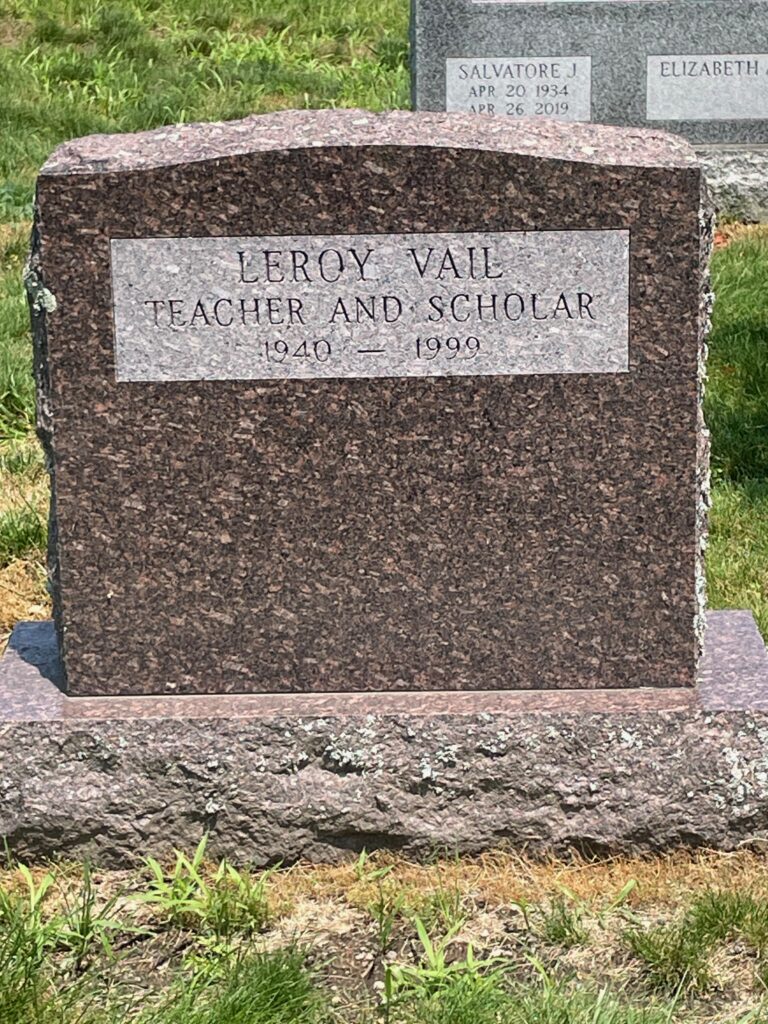Erik Visits an American Grave, Part 1,501
This is the grave of Leroy Vail.

Born in 1940 as Hazen Leroy Vail in Boston, Leroy, as very much demanded to be called, was born of Canadian immigrants. Despite this highly questionable background, he proved to be a real smart kid. He just attended the local public schools, almost unheard of among successful people in New England (*gasp* public school!!!) and then went to Boston College. He initially wanted to study the classics, but he then switched to history and graduated from that school in 1962. Vail then went to Wisconsin for a Ph.D. program. He intended to work on British imperial history under the mentorship of Philip Curtin. But Curtin and Jan Vansina were starting a new track of study that they called “comparative tropical history.” While that is never a term one would use today, for the early 60s, this was pretty forward thinking given how little interest or even knowledge there was in the United States about Latin America, Africa, or Asia. I mean, remember that this was the same time that the U.S. was entering the war in Vietnam without knowing the first thing about that nation. Not that greater academic knowledge would ever make a difference in Beltway foreign policy circles, given that the Bush administration went into Iraq uninterested in understanding the politics between Sunni and Shi’a Muslims……
Anyway, Vail got into this and he became a pioneering historian of Africa. He started working in Malawi and in fact stayed there for several years, teaching at the newly founded University of Malawi. He was actively supportive of the new nation and the broader anti-colonial efforts of Africa at that time. However, he turned harshly on the administration of Hastings Banda, the elected president of that nation who turned into a real scumbag dictator. Alas, that would happen so often in Africa. So Vail got out of there in 1971 and became a sharp critic in the West of Banda, who remained in power until 1994.
Vail tried to go back to the U.S. but there just weren’t really schools interested in teaching African history in the early 70s. So he ended up at the University of Zambia from 1972 to 1978, where he published widely on that area of African history, including Malawi and Mozambique. Finally, the University of Virginia offered him a job in 1978. This was just a visiting position and he floated around for a few years in one-year positions–UCLA and Ohio University after that. It was still years of moving around before he finally got a tenure-track job, which Harvard gave him in 1984. Meanwhile, he was already of the leading historians of the continent, having published Capitalism and Colonialism in Mozambique with his co-author Landeg White. Vail spent the rest of his career at Harvard. The Creation of Tribalism in Southern Africa was a major accomplishment that came out of a conference he organized. He and White then wrote Power and the Praise Poem: Southern African Voices in History, about oral history and the power of popular songs in southern Africa.
Vail maintained his broader interest in African freedom too. When Banda was finally ousted in 1994 and the nation had free elections for the first time, Vail returned to serve as an election monitor under the auspices of the United Nations. He continued to work as well. At the time of his death, he had all sorts of projects, including on spirit possession in Malawi and Zambia since 1850 and on the idea of ethnogenesis in Togo. He also finished an English-Lakeside Tonga dictionary shortly before his death. But he began to have severe health problems. He had a massive heart attack, but more or less recovered. However, in 1998, he was diagnosed with lymphoma and that took him in 1999. He was 58 years old.
Leroy Vail is buried in Sleepy Hollow Cemetery, Concord, Massachusetts.
If you would like this series to visit other scholars of Africa, you can donate to cover the required expenses here. Hugh Brooks is in Montclair, New Jersey and John Clarke is in Columbus, Georgia. Previous posts in this series are archived here and here.


